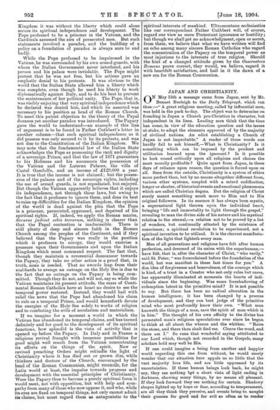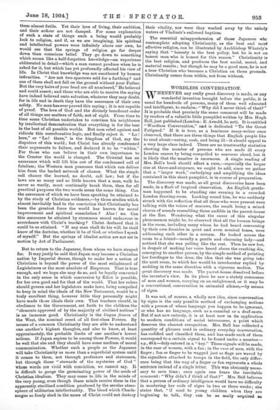JAPAN AND CHRISTIANITY.
ON May 15th a message came from Japan, sent by Mr. Bennet Burleigh to the Daily Telegraph, which ran
thus :—" A great religions meeting, called by influential men, was held in the park to-day. The object was to determine on founding in Japan a Church pro-Christian in character, but independent in its lines. Leading men think that the time has come, in view of the education question and the issues at stake, to adopt the elements approved of by the majority of civilised nations. An edict establishing a Church of Japan is not improbable." A reader of these words can hardly fail to ask himself,—What is Christianity ? Is it something which can be imposed by the prudent and utilitarian learned upon the ignorant ? Is it possible to look round critically upon all religions and choose the most morally profitable ? Quite apart from Japan, in these days of reliance upon reason, the question is forced upon us all. Seen from the outside, Christianity is a system of ethics more perfect than, but by no means altogether different from, various other systems, coupled with a mixed codification, longer or shorter, of historical events and emotional phenomena which are called Christian dogma. But the religion of Christ surely meant something much more to Him and to His original followers. In its essence it has always been mystic, a supernatural light thrown upon the individual heart, bringing "life and immortality to light through the gospel,"
revealing to man the divine side of his nature and his mystical relation to the eternal,—a relation not to be proved by n list of wonders, but continually attested by the existence of conscience; a spiritual revelation to be experienced, not a spiritual invention to be utilised. It is the clearest manifesta- tion of the light that lighteth every man.
Men of all generations and religions have felt after human perfection, and dreamed of its union with the superhuman,— have felt, that is, after the character of Christ, "who verily," said St. Peter, "was foreordained before the foundation of the world, but was manifest in these last times for you." A dim idea of forgiveness and benevolence, of the courage which is kind, of a trust in a Creator who not only rules but cares, has apparently illuminated at moments the hearts of indi- viduals since the beginning. Was some foreshadowing of redemption latent in the primitive mind? It is not possible to say. But there has been no radical alteration in the human intelligence; it has been changed by a process of development, and they can best judge of the primitive mind who most profoundly know their own. "What man knoweth the things of a man, save the spirit of man which is in him." The thought of his own affinity to the divine has permeated man's religious speculations ever since he began to think at all about the whence and the- whither. "Raise the stone, and there thou shalt find me. Cleave the wood, and there ant I." So runs that wonderful saying attributed to our Lord which, though not recorded in the Gospels, many scholars hold may well be His.
If one could imagine a being from another and happier world regarding this one from without, he would surely wonder that our situation here appals us so little that the vast majority love life, and are little oppressed by ita uncertainties. If these human beings look back, he might say, they see nothing bizt a short vista of light ending in darkness, showing many things, by no means all pleasant. If they look forward they see nothing for certain. Shadowy shapes lighted up by hope or fear, according to temperament, are all they think they perceive, and events bring to naught their guesses for good and for evil so often as to tendez
them almost futile. Yet their love of living, their ambition, and their ardour are not damped. For some explanation of such a state of things such a being would probably look to religion, and if, as we are imagining, his spiritual and intellectual powers were infinitely above our own, he would see that the springs of religion go far deeper down than conscious belief. They go down to something which seems like a half-forgotten knowledge—an experience obliterated in detail—which a man cannot produce when he is asked for it, but which has yet profoundly affected his view of life. In Christ that knowledge was not smothered by human infirmities. "Are not two sparrows sold for a farthing ? and one of them shall not fall on the ground without your Father. But the very hairs of your head are all numbered," He believed and could assert; and those who are able to receive the saying have indeed believed unto salvation, whatever they may doubt, for in life and in death they have the assurance of their own safety. No man has ever proved this saying ; it is not capable of proof. The love of God and the divinely beneficent order of all things are matters of faith, not of sight. From time to time some Christian undertakes to convince his neighbours by intellectual demonstration that everything is for the best in the best of all possible worlds. But men rebel against and ridicule this corroborative logic, and finally reject it. " Lo ! here," or "Lo! there," is the kingdom of God, say the disputers of this world; but Christ has already condemned their arguments to failure, and declared it to be "within." For those who can believe in their own importance to the Creator the world is changed. The Oriental has an assurance which will lift him out of the condemned cell of fatalism; the Western man possesses that which can deliver him from the barbed network of chance. What the simple call chance the learned, no doubt, call law ; but if the laws are so many and so little known that a man, walk he, never so warily, must continually break them, then for all practical purposes the two words mean the same thing. Can the assurance of which we have been speaking be attained to by the study of Christian evidences,—by those studies which almost inevitably lead to the conviction that Christianity has been the greatest force the world has known for moral improvement and spiritual consolation P Alas ! no. Can this assurance be attained by strenuous moral endeavour in accordance with Christ's teaching P Christ declared that it could be so attained. "If any man shall do his will, he shall know of the doctrine, whether it be of God, or whether I speak of myself." But the springs of idealist action are not set in motion by Act of Parliament.
But to return to the Japanese, from whom we have strayed far. It may justly be said that Japan may become a Christian nation by Imperial decree, though to make her a nation of Christians is beyond the power of the most enlightened of Legislatures or the most absolute of Emperors. That is true enough, and we hope she may do Bo, and be legally converted in the only sense in which conversion by Edict is possible, for her own good and for that of the world. That her rulers should govern and her legislators make laws, being compelled to keep in mind the ideals of the New Testament, would be a truly excellent thing, however little they personally might have made those ideals their own. That teachers should, in obedience to the Government, set forth to the children the "elements approved of by the majority of civilised nations" is an immense good. Christianity is the lingua franca of the West, the nominal creed of all first-class Powers. By means of a common Christianity they are able to understand one another's highest thoughts, and also to know, at least approximately, the probable limits of one another's lowest actions. If Japan aspires to be among those Powers, it would be well that she and they should have some medium of moral communication. Whether such a people as the Japanese will take Christianity as more than a superficial system until it comes to them, not through professors and statesmen, but through those "stewards of the mysteries of God" whose words are vivid with conviction, we cannot say. It is difficult to gauge the germinating power of the seeds of Christian idealism. They may come to life in the minds of the very young, even though these minds receive them in the apparently sterilised condition produced by the secular atmo- sphere of utilitarian intellectuality.. The blood winch Charle- magne so freely shed in the name of Christ could not destroy
their vitality, nor, were they washed away by the unholy waters of Vladimir's enforced baptism.
The essential misapprehension of those Japanese whc contemplate adopting Christianity, as the best and most effective religion, can be illustrated by Archbishop Whately's saying that "honesty is the beat policy, but be is not an honest man who is honest for this reason." Christianity is the best religion, and produces the best social, moral, and material results ; but though he may be a good man, he is not a true Christian who becomes a Christian on these grounds. Christianity comes from within, not from without.







































 Previous page
Previous page